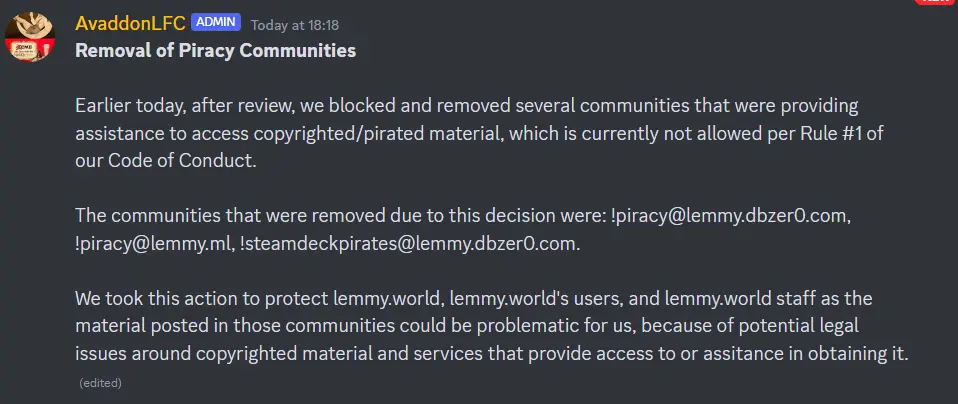this post was submitted on 14 Aug 2023
940 points (99.3% liked)
Piracy: ꜱᴀɪʟ ᴛʜᴇ ʜɪɢʜ ꜱᴇᴀꜱ
54716 readers
262 users here now
⚓ Dedicated to the discussion of digital piracy, including ethical problems and legal advancements.
Rules • Full Version
1. Posts must be related to the discussion of digital piracy
2. Don't request invites, trade, sell, or self-promote
3. Don't request or link to specific pirated titles, including DMs
4. Don't submit low-quality posts, be entitled, or harass others
Loot, Pillage, & Plunder
📜 c/Piracy Wiki (Community Edition):
💰 Please help cover server costs.
 |
 |
|---|---|
| Ko-fi | Liberapay |
founded 1 year ago
MODERATORS
you are viewing a single comment's thread
view the rest of the comments
view the rest of the comments


Just replace "Lemmy instance" with "blog", and the answer is obvious.
"consider a Mexican user visiting a blog located in Germany to view Nazi content."
The user is subject to Mexican laws. The blog owner would be subject to German laws. The instance owner is likewise subject to German laws.
Adding additional parties doesn't change anything. For example, if a Mexican user on a Swiss VPN views content originating from a blog in Germany, then the user, the VPN, and the blog are all subject to laws of their own jurisdiction.
Those laws can regulate what content you can access, what content you can host, or both.
If you are American then your Lemmy instance is most likely be protected by section 230, and you probably don't have to worry too much about non-pirated content. If you live in another country or host pirated content in the US, then YMMV.
Exactly, users and hosts are subject to laws around using and hosting in their own jurisdiction. Instances caching posts are hosts.
Actually it's not because there's no 3rd party like there is with Lemmy and especially not a 3rd party that's keeping a cache (copy) of the content.
So there's no American users on lemmy.ml, lemmygrad.ml, hexbear.net, or even lemmy.world itself? You'd be very very wrong in that assumption.
Aaaand we are back where we started. What is "hosting"? Your lemmy "home", lemmy.today for me, has a cached copy of all the content it's users view. So if I retrieve illegal material my instance has it too and while it's hidden it IS retrievable by both the Instance Operator and other users (if they know how).
So whose door(s) are the cops kicking down in the raid? Mine? Lemmy.Worlds? The one at exploding heads / lemmynsfw / db0zer? All of them?
3rd parties are not new. All these issues came up when Google, YouTube, etc started storing third party content. They still exist today because they followed the rules.
What? No, my point is that if you are American and host an instance, you'll probably be ok. Just like Google and YouTube.
If you are not American and host an instance, then all bets are off. If you are Swiss, then you are probably ok. If you are North Korean, then maybe the police are coming for you right now.
In the US, if you have copyrighted content on your server and the copyright holder says "Get rid of it", then you have to get rid of it. As long as you comply, you'll be ok. That's literally YouTube's business model.
If you refuse, then the cops might come for you. In the US, cops don't go after users who download copyrighted content, only those who make it available to others.